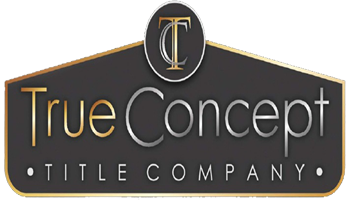Whether this is your first time buying a house, or you’ve gone through the process multiple times, escrow can be a little confusing. It’s unavoidable when purchasing a home, True Concept Title dives deeper to explain escrow.
Escrow + Home Offers
The time has come! You’ve found the perfect house and you are ready to make an offer on it! When you make this offer, you write an earnest money check that will be then placed in “escrow.” But what is escrow? What it all boils down to is that your house and the money that you paid for it are in a sort of limbo.
Escrow is a bond, deed, or other document kept in the custody of a third party and taking effect only when a specified condition has been fulfilled.
When you buy a house, this means that the money isn’t just going directly into the seller’s bank account, but it is being held by an impartial third party until the contract is negotiated and the deal is closed. You can’t touch the money, and neither can the seller. It’s in escrow.
Escrow protects both parties and ensures that everyone gets what they are due when the deal is done. If you put down earnest money that went directly to the seller, and then couldn’t reach a sale agreement or purchase, the seller could then hold the money hostage as a negotiating ploy. On the other hand, the seller won’t want to sign over the deed to their home unless you have paid for it. This is why escrow is so important!
Escrow + Lenders
When you begin talking to your mortgage lender, you’ll inevitably hear about escrow again. You might hear the terms, “escrow,” “impound,” account, or “reserves,” used interchangeably.
The lender will hold onto these funds and make payments towards your homeowners’ insurance and property taxes with them. These are collected by your lenders monthly, along with your loan payment, which allows them to then pay the tax and insurance bills when they come due. Why? Well, your lender has a vested interest in making sure your house insurance and taxes are paid.
Escrow + Closing
When your house purchase is complete, you might hear the term “closing of escrow.” A closing or “escrow officer” will oversee the final paperwork, and then handle the exchange of the funds and deeds before closing escrow. Once escrow is closed, the deal is closed!
Through our centralized escrow division at True Concept Title, we manage and coordinate order entry, escrow, funding, and disbursement for all loan types!
Tips about Escrow:
- If you’re buying a newly constructed house, your funds might be held in escrow until all work is complete, and you’ve approved it.
- Once escrow is closed and all funds have been disbursed, you and the seller of the property will receive a final closing statement and other documents, Be sure to check these statements carefully for any errors and file them in a safe place, as you will need them when you file your next income tax return.
- Escrow generally costs about 1% to 2% of the cost of the home.
- Escrow can be a safeguard for any home inspection contingencies. If the buyer did not fix the issues that they said that they would, escrow works as a safeguard for the buyer. The closing will not go through until all contingencies are met.
- Sellers benefit from escrow too, especially if the buyer starts to get cold feet at the last minute before closing. If the buyer backs out, they forfeit the 1-2% of the purchase price that has been held in escrow.
- After closing, you can expect to pay monthly payments equal to one-twelfth of the costs of your yearly property taxes and house insurance to keep your escrow account funded.
Call our Escrow & Title Company
True Concept Title Company offers full escrow processing services in all 50 states. We work directly with you to manage and coordinate order entry, escrow, funding, and disbursement of all loan types.
Contact True Concept Title for all of your title and escrow needs! Call us today 866-651-6224.


